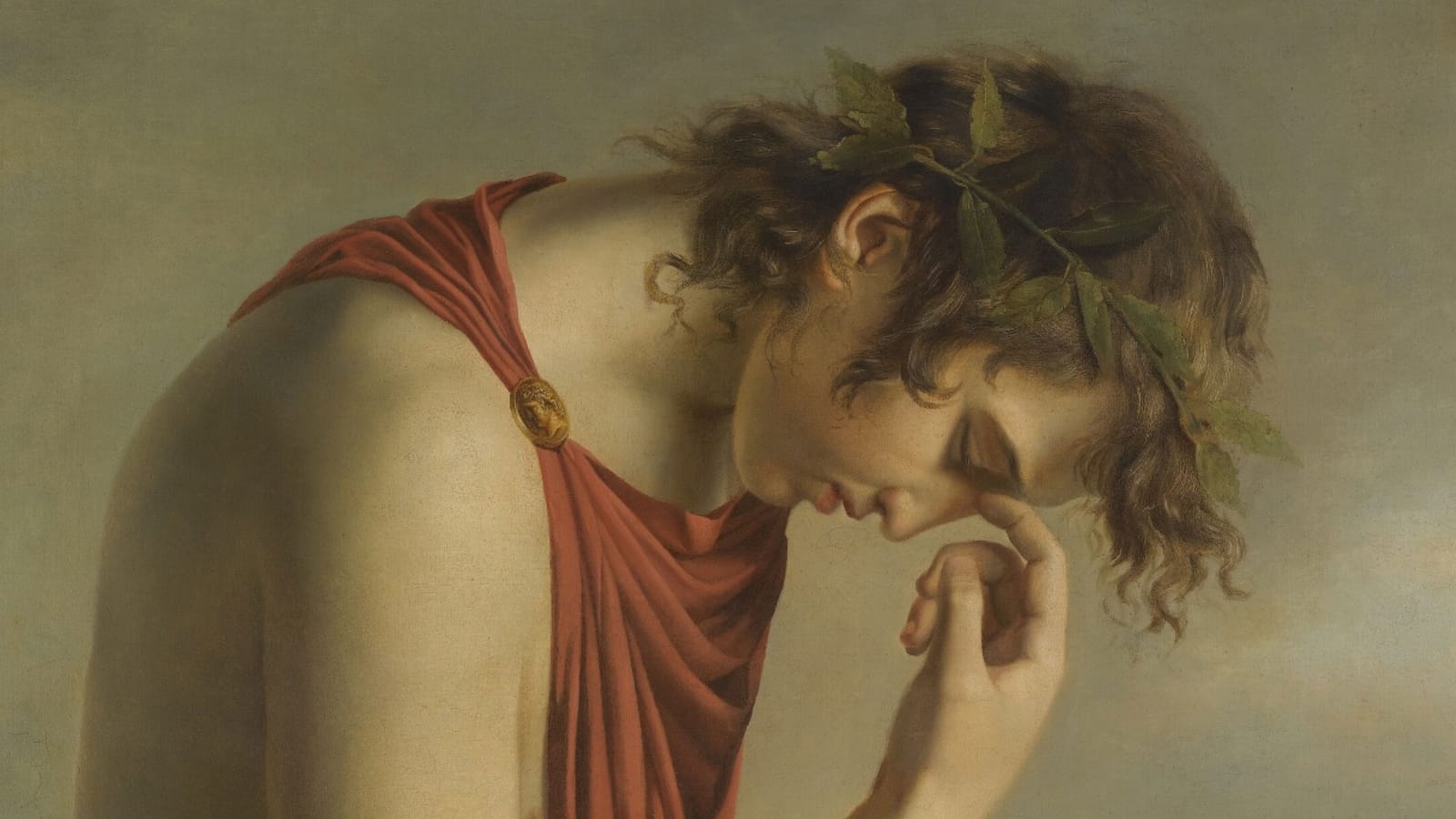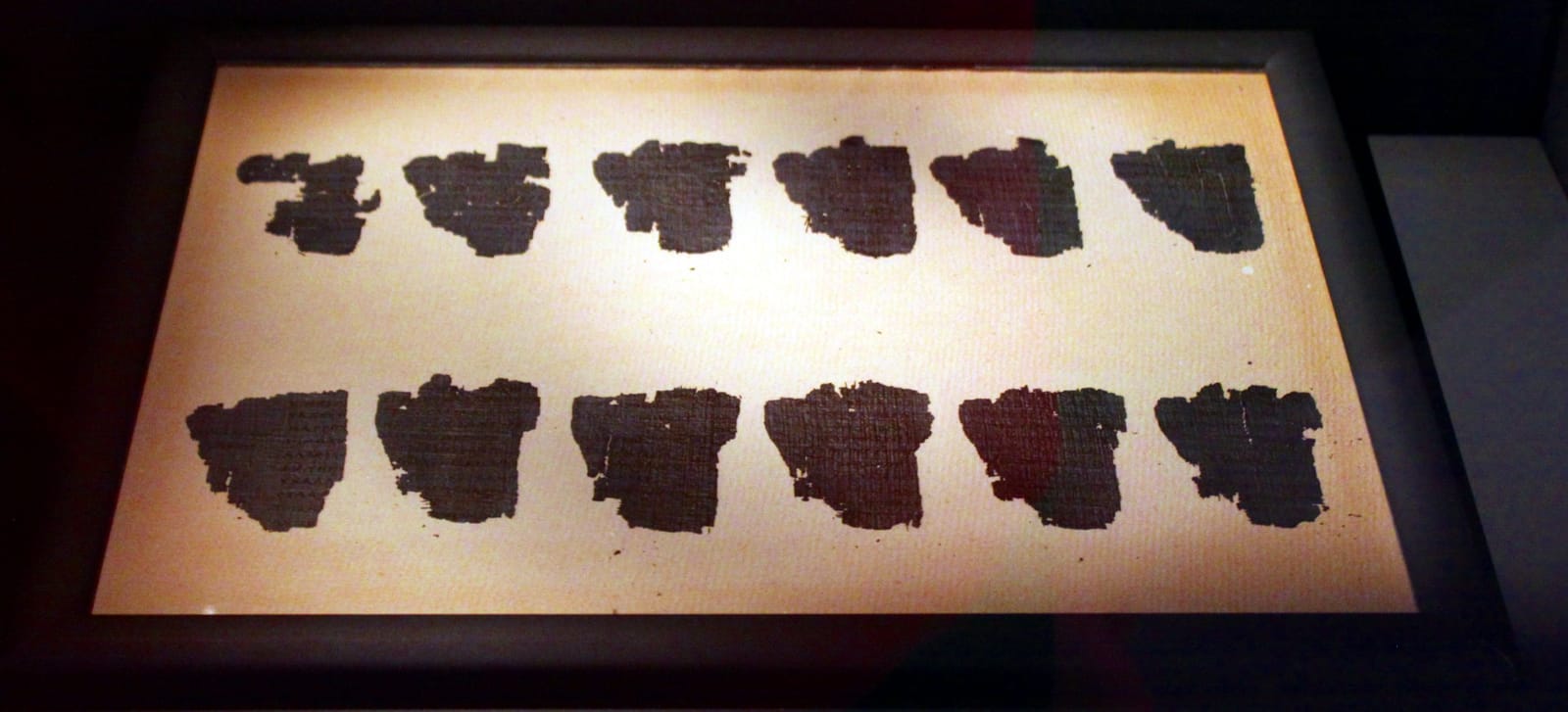 Orpheus by Paul Duqueylard, ca. 1801 (public domain, via Wikimedia Commons)
Today: Talia Lavin, author of Wild Faith.
Issue No. 207I Am Ready to Move to A Cave to Explore the Orphic Mysteries
Talia Lavin
I Am Ready to Move to A Cave to Explore the Orphic MysteriesThe Derveni Papyrus, dating from ~340 BCE, is the oldest surviving text in European literature, and the first papyrus to be discovered in Greece. It was found in 1962 by a man at work with a bulldozer on the widening of a road who wound up accidentally uncovering a necropolis. The site was soon taken over by the Greek Archaeological Service, which recovered the papyrus—a black lump that had been tossed on the covering slabs of the tomb of a nobleman along with other charred remains of his funeral pyre, including a gilded wreath, spearheads, a horse’s harness and a pair of ivory eyes. The bronze crater in which this noble was entombed lay close to a shrine to Persephone, the doomed wife of Hades, god of the Underworld. The papyrus met with a better fate than the goddess did—it was rescued by archaeologist Petris Themelis, whereupon its fragments were unrolled and preserved between sheets of glass in the Archaeological Museum of Thessaloniki.  The Derveni Papyrus (Fkitselis [CC BY-SA 3.0] via Wikimedia Commons) Over the years the text revealed tantalizing clues about a shadow religion far removed from familiar Greek mythology, with its legendary heroes and high ambrosial Olympus, full of horny, bickering gods. Scholars have pored over the Derveni Papyrus as (among other things) a possible key to the Orphic mystery cult, a group who worshiped the tragic figure of Orpheus, a bard torn apart by sex-mad Maenads, who left his head intact to float down the rivers of the world singing a sad song. The cult claimed to possess, and to worship, his poetry; their practices revolved around secret rites of ecstatic frenzy, and their beliefs involved metempsychosis and reincarnation. In the Papyrus as interpreted by some contemporary Greek scholars, the Sun originated when the severed penis of the ur-god Uranus became a phallic celestial light, and Zeus then swallowed it, became pregnant with the universe, and gave birth to all things. (The fate of Uranus’s phallus here diverges from more mainstream Greek myth: in other versions, the god Kronos cast the severed member into the sea, from which splash and foam emerged Aphrodite.) When an Orphic practitioner died—according to a gold funerary pendant of the type known as “totenpass,” or “death passport” to the underworld, found in the grave of a cult adherent—he or she was adjured to spurn the waters of Lethe, the pool of forgetfulness. Instead, he is to say: I am the child of Earth and starry Heaven;
But my race is heavenly; and this you know yourselves.
But I am parched with thirst and I perish; but give me quickly
refreshing water flowing forth from the lake of Memory.
I’ve been very interested in the mysteries of Orphism lately. It’s all ghosts and severed cocks that become the sun, forbidden pools and necessary lakes, and ritual mock dismemberments, wine orgies and death-pyres. All of it seems like a good thing to retreat to a cave and study, an option that recent developments have made far more appealing as a life path.
Less than a month before the U.S. presidential election, I released a book on the subject of the Christian right, and victims of the inherent violence of its domestic injunctions, to wit, the enforced submission of women and the violent domination of children. The book was the culmination of three years of research and around a hundred and fifty interviews. And then for another month, I talked and wrote about these things constantly.  Cover of Wild Faith by Talia Lavin I was hopeful—naively hopeful but not, of course, in any way certain—that the people I’d been writing about, whom I had grown to hate with the contempt only familiarity can breed, were about to be delivered a meaningful blow to their relevance and power. Not a fatal one; they’d spent half a century gathering power and weren’t going to stop, regardless. Instead they got handed a big fat W and their very own cherished mandate of heaven. And now their vilest plans are efflorescing—sneaking the Bible into public schools in Texas and Oklahoma; enshrining anti-trans bigotry and systemic exclusion in the very halls of the Capitol; tightening the ongoing stranglehold on abortion, suggesting looming threats to birth control, to divorce, and to any hint of sexual privacy for the people, even as a gang of open, even gleeful male sexual predators is ushered into the highest cabinet posts. (Sexual predation against women and girls by powerful men challenges neither patriarchy, nor compulsory heterosexuality; hence the laissez-faire attitude towards its perpetrators by the purported moral guardians of the nation.) For the moment my response is not quite despair nor yet helpful rage, but numbness and exhaustion. In the first go-round, reporting on the Trump presidency and the broader movement around it, I remember the way this oleaginous ego-hog insinuated his way into every aspect of our lives, so that everything seemed clogged up in a kind of half-shocked, half-numb reactivity to him, him, him, him and everything he did or said. And the people around him—this time even more than the first a kind of kayfabe fuck-you to the libs, a show-biz cabinet containing a Fox News host, a green coffee enema purveyor, a measles-loving bear killer, and alleged sex traffickers—amplified all of it, part of a general aura of appointment-TV politics in which looking away is posited as a malfeasance, an abrogation of civic duty. But the cumulative effect of looking directly at what’s happening sears the eyeballs and the soul at once, it is a grim thing, and an even grimmer thing to live through twice. I don’t know how to do it. Genuinely! I do know that forcing oneself to pay attention to every detail, small and large, as if they all bear equal weight, is not the answer; that can only lead to burning out faster than the nation’s forests. You can get the general gist of corruption and cruelty without knowing every tiny detail; you can focus on the issues that matter to you most, because you have to narrow your focus to stay sane and survive. The fact that my job is to look doesn’t mean I can look all the time or at everything. I have to choose, and the fact that attention is being demanded of me by both ogres and well-meaning but ill-equipped “resisters” does not mean I must meet that demand. You have to cultivate, if you can, an inner space that’s free of all of it. And maybe that means taking time off (if you can afford it, which most of us can’t) and recognizing the signs of burnout and backing off accordingly (again, if you can afford it, which most of us can’t). The goal is to make an unpolluted place in the self to retreat to if necessary.  Gregorio Lazzarini, Orfeo e le Baccanti, ca. 1698 (public domain, via Wikimedia Commons) What I would really like to do is move to a well-appointed cavern and study Orphism, with its populous Underworld full of shades and beings and demons, Kore and Rhea and Protogonos (born from a cosmic egg), and the chthonic penumbras of all the bright surface Gods. A life of studying mystery itself. Trumpism puts everything out there into a world where all is ugly and nothing enigmatic or subtle, a place where open glaring malfeasance is never, ever punished. No one is ever ripped apart by maenads, cursed with insatiable hunger, bound to burning wheels, or turned into trees, rocks, spiders or herbs, no matter how ripely they deserve it. Corruption and predation and garishness are this American religion’s ruling triumvirate of gods, and they will demand our time at their altar, our attention and our suffering. It is fitting to withhold it from them, when you can. Sometimes it is better to drink from the pure, cold lake of Memory, and be sated. The Orphic mysteries, at this distance, demand little; they compel by allure. The shades and protogods in its mythos can be propitiated with wine as necessary; they are strange and beautiful in their hiddenness, waiting to be found in the fragments of half-burned papyruses, and their rageful violent stories have been muted by the long snowfall of centuries. There are worse things to turn to for guidance than a dismembered bard who came back from hell and sang; even when he lost his body he sang.
HYDRAS SPEAKThe Indignity Morning Podcast reads The New York Times so you don’t have to! An incredible public service. Today, gnarly news of yet another glob of right-wing freak Silicon Valley money aimed at destroying civilization, and the total dissolution of the rule of law. Plus Icelandic volcanoes, yay.
Send us money! We need it, as much as you’ve got, to protect press freedom and independence, and to create good, valuable, and fun things to read.
|